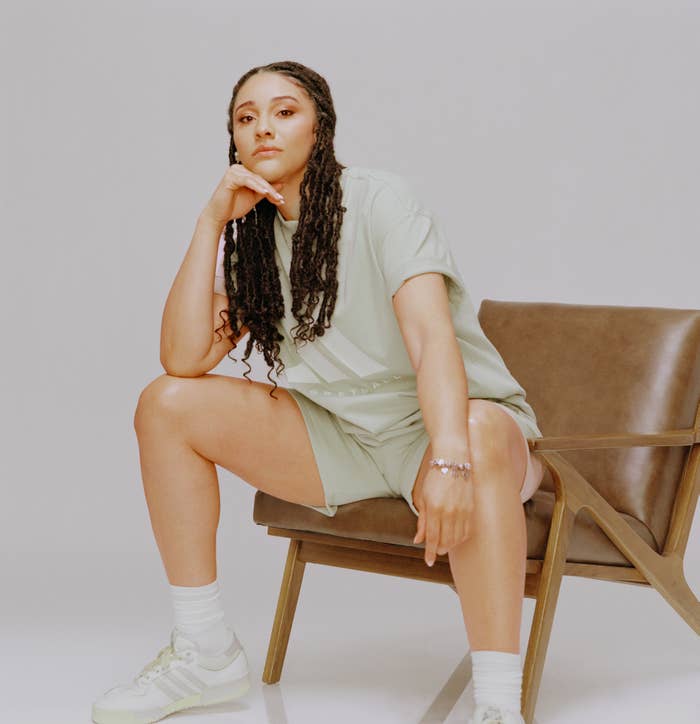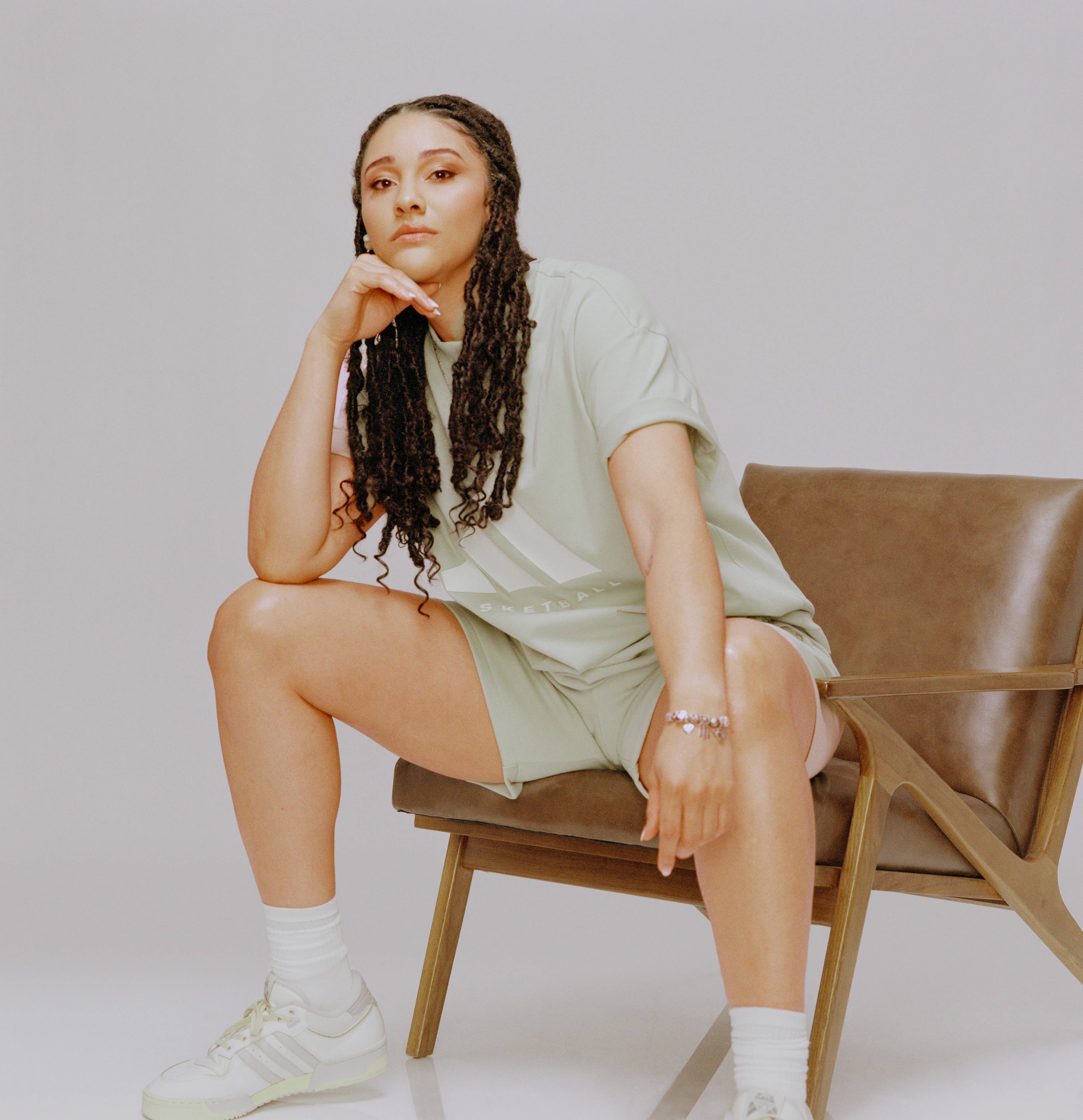
Natalie Achonwa is always up to something.
As captain of the Canadian senior women’s basketball team, a veteran of the WNBA’s Minnesota Lynx, Treasurer of the WNBPA Executive Committee, one of the faces of adidas Canada, and a soon-to-be mother, Achonwa is always working, on and off the basketball court.
The 30-year-old Toronto native says being busy and having multiple jobs is just the reality of being a woman basketball player, but it’s also something she’s come to genuinely embrace. After all, Achonwa is all about being a representative for the next generation of Canadian female ballers to look up to.
After a busy offseason that included helping Team Canada finish fourth at the 2022 FIBA World Cup and announcing her pregnancy, we caught up with Achonwa to discuss the growth of women’s basketball in Canada, becoming more of a public figure, her partnership with adidas Canada, and bringing a WNBA team to Toronto. The conversation has been edited for length and clarity.
I’m a big believer that representation and seeing yourself in people matters. Whether that’s just seeing a woman on a NBA broadcast, seeing a Canadian representing adidas, being Canadian in the WNBA, or being a Black woman that owns multiple properties—whatever that representation that I can be, the publicity allows more people to see themselves being whatever they want to be.
For the people that don’t know, take me through your basketball journey. When did you start playing ball, and how did you get to this point?
I really started playing basketball by accident. I had a growth spurt and my soccer coach was the one who introduced me to it by basically saying, “Hey, you’re kind of tall. Maybe you should try basketball.” So that’s where it originally started. It wasn’t that I was naturally talented at hoops or that I had this long dream and aspirations to play professionally. They’ve kind of developed over the years, and a huge contribution to that dream and development has been Canada Basketball.
I was first introduced to Canada Basketball at the junior national team level, and then quickly got called up to the senior team at age 16, which is the Olympic team that I play on now. I was a very awkward, Bambi-esque player, and just new to the game. So it was a lot of faith that Canada Basketball instilled in me and saw in me at such a young age to pull me up and play me alongside women. I was playing with professional athletes and I learned quickly that it’s better to be a sponge at that point and to absorb as much as possible from the vets that I was surrounded by.
Former head coach Allison McNeill always said Canada Basketball is the best-kept secret in Canada. Because at that point, we didn’t necessarily have the notoriety. We weren’t in the Olympics. We didn’t have Sportsnet partnerships where we were being seen and watched in Canada. So it was a lot of trench work. And that was when the true core of Canada Basketball’s senior team was developed, and I was very fortunate to learn from some of the greatest to play basketball in Canada and to be a part of that.
It must be crazy to think about how far the program has come in the following decade, from an international afterthought to the fifth-ranked nation in the world, right?
For sure. The growth has been tremendous, and not only in the results that we’re producing, but also in the talent level. Some of the young women that are playing in college now and even in high school, they’re dunking. So the athleticism alone is very different from when I was growing up.
But it’s great to see that growth in the game and for us to be able to continually grow you have to challenge yourself. For a while there, we were just taking the steps: the first Olympics in London 2012, we were the final team to qualify and were just happy to be there. And then, in Rio 2016, we had a little bit more expectation because our level of play had grown and so we were expecting to do a little bit better. And then I think Tokyo 2021 was the one where it was like, “podium or bust.” And I think we put too much weight on ourselves—we put too much pressure on ourselves and we almost suffocated our dreams.
And so that brings us to the present, which we have kind of labelled the “Lapeña era” with our new head coach, Victor Lapeña. We are trying to take those next steps in transforming our culture to a winning mindset, as he likes to say. And that’s really focusing and investing in the work and less on the results. When you have that winning mindset and when you choose to focus and commit to the work, the results will come.
When you think about all the Canadian women’s talent we have in high school and college right now, how excited are you for the future of the Canadian program?
I’m super excited. For one, like you said, the blending of—I don’t call myself old. I’m not quite in the old category, but blending the old and the new is definitely an exciting time for Canada Basketball. To be able to take this what I call “slow is pro” thought process of being meticulous, understanding the game, breaking the game down, using that intellectual aspect of the game—which has been my niche for years—and combining with this new era of athleticism, speed, and how truly incredible athletes these young women are: blending that together and creating this new Canada Basketball is super exciting. I can’t wait to see what levels and growth that Canada Basketball can reach, because we truly are ceiling-less.
Yes! We need a WNBA team. But looking more in-depth, we need a pro league in Canada.
Outside of the national team program, how have you seen the game of basketball grow in Canada since you were young? Are more young women being inspired to play?
I think of a couple big points that have kind of changed and sparked the fandom of basketball in Canada, and one of course is the Toronto Raptors winning the NBA Championship in 2019. And of course that’s men’s basketball. It’s not the same. But I think about how everyone, the entire nation, was able to come together and see the power of sport and see the power of basketball. You had people from all walks of life coming together to celebrate the Raptors, and I think that transforms your basketball fandom regardless of what league or what team it was. It truly made not only people in Canada but outside of Canada aware that we’re more than a hockey country. That we support—that we love basketball here in Canada.
And I think the second part is just having women’s basketball on TV. When I was growing up, I didn’t even know the WNBA existed. And now with Canada Basketball and the WNBA appearing regularly on Canadian TV, it helps keep women’s basketball top of mind for people to continue to grow that appetite for it. Because I definitely think there is a market for women’s basketball in Canada. And I don’t think we’ve truly tapped into it and taken full advantage of it because the support is there but unfortunately we only get to see the support once in a while like during the Olympics and other big events.
One way we could get to tap into some of that support is by bringing a WNBA team to Toronto. How important would that be?
Yes! We need a WNBA team. But looking more in-depth, we need a pro league in Canada. We always talk about the 144 with the WNBA: there’s only 12 teams and 12 athletes per team. It’s really hard to get and to stay in the WNBA. So, yes. We need a WNBA team here in Toronto—in Canada, but I’m biased to Toronto. We need a team here because it’s the best league in the world.
You mentioned a domestic league. Given that Canadian girls are dropping out of organized sports at an alarming rate, could domestic basketball leagues (such as the new Canadian Women’s Soccer Premier League) help incentivize more of them to stay in basketball and pursue a career?
Yes, we also need a league. And that’s maybe selfishly thinking of Canada Basketball and growth of the game in Canada, but we need more development of women’s basketball, and it comes from having a league. Look at the CEBL and the success that they’ve had in Canada on the men’s side, and why can’t we, I don’t want to say replicate it, because women’s basketball is very different, but the model of having a pro league in Canada, why can’t we work with them? Or why isn’t there something similar developed on the women’s side?
And that’s to grow the game in general, our pool of talent. You have so many female athletes that quit basketball earlier than they should because the only option is you graduate college, you can’t make the WNBA because it’s hard to crack into, and you go overseas. And as someone that’s played in multiple countries overseas and that has loved the experiences that I’ve gained from them, It takes a different person, it takes a different breed to live that life. It’s not for everybody. And so I think having a league in Canada would be huge for the growth of the game. And, selfishly, for Canada Basketball to continue to expand our pool of athletes.
You’ve personally been in a more public-facing role recently, appearing on TV broadcasts during the summer and in some recent photoshoots with adidas Canada. Why have you embraced that role as an outspoken advocate for the sport?
For me, it’s never been about being in the public. A lot of the decisions that I make off the court in terms of brand partnership and in terms of doing the TV commentating has been to build a platform that allows me to give back and to touch the lives of young girls and boys in a different way.
Growing up, I didn’t see the WNBA on TV, and I’m a big believer that representation and seeing yourself in people matters. Whether that’s just seeing a woman on a NBA broadcast, seeing a Canadian representing adidas, being Canadian in the WNBA, or being a Black woman that owns multiple properties—whatever that representation that I can be, the publicity allows more people to see themselves being whatever they want to be. And I think it’s important to have people to look up to and so I embrace whatever opportunity allows me to do that. I think that’s truly my “why” in what I do, and why I think the transition in my career has been to be more outspoken and be hopefully more of a role model to the next generation.
As a whole, the WNBA is at the forefront of advocacy for many social issues, including the COVID vaccine and Black Lives Matter. They have been far ahead of most other pro leagues when it comes to some of their social work. As someone who sits on the WNBPA executive committee as the treasure, why is the WNBA so progressive?
We’ve kind of been thrown into this social justice world and I think a lot of it stems from the fact that a majority of our league is Black women. And we’re already a double negative in society, right? We’re Black and we’re women. And I think we innately just want to help others. We innately want to improve the lives of others. And whether that’s from our own journeys, our own experiences, or just echoing those around us in our communities, it’s just something that we do.
Plus, you add the education of our league and the intelligence of our league—you can’t enter the WNBA unless you’re a college graduate or over the age of 22. So I think that comes into it, too, is that we have this internal drive to help others along with educated people who are thoughtful and detailed and work together. I think that’s what creates such a tremendous force of the WNBA is that we decide what we want to do and when we attack it. We do it full force together.
Before we let you go, in the NBA this season we are seeing a ton of Canadians have success like never before. Are you looking forward to the day when Canadians begin to take over the WNBA in a similar way?
Yeah, of course. I can’t wait until the day when it’s the norm and we don’t have to count the numbers. I know we have only three Canadian WNBA players right now, but a couple years ago, we had seven. And so I can’t wait until the day when it’s the norm and there isn’t just the three of us. And that it’s a legitimate opportunity and goal of Canadians to be able to play in the WNBA.
And once again, I think having that team in Toronto, in Canada, would make that difference, too, by allowing girls to have a goal to aspire to.
To learn more, head to adidas basketball’s website.


